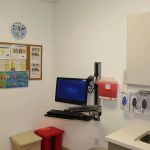Essential Tips for Caring for Your Teeth After a Dental Cleaning
After a professional dental cleaning, it’s important to maintain the health of your teeth and gums to ensure long-lasting results. Dental cleanings are an essential part of oral hygiene, but the real work begins when you leave the dentist’s office. Many people underestimate the care required after a cleaning, but taking the proper steps can significantly improve your oral health and prevent potential issues down the road.
1. Maintain a Good Oral Hygiene Routine
After your dental cleaning, it’s crucial to continue practicing your daily oral hygiene habits. Brushing your teeth twice a day with fluoride toothpaste helps remove plaque and food particles. You should use a soft-bristled toothbrush to avoid damaging your gums, especially after a cleaning. Be gentle when brushing, as your gums may be slightly sensitive following the procedure.
Don't forget to floss daily. Flossing helps remove plaque and food that gets stuck between your teeth, areas where your toothbrush may not reach. Many people underestimate the importance of flossing, but it’s one of the best ways to prevent gum disease and cavities. After a professional cleaning, your gums may be more prone to inflammation, so flossing regularly is a great way to maintain a healthy mouth.
2. Avoid Certain Foods and Drinks Immediately After Cleaning
Immediately following a dental cleaning, you may experience some sensitivity, especially if you’ve had tartar removed or if your gums were gently treated. To help your teeth recover, avoid eating or drinking anything that could irritate your sensitive gums. Foods and beverages like hot coffee, cold drinks, or acidic fruits should be avoided for at least a few hours after your cleaning.
It’s also a good idea to steer clear of sticky or hard foods, as they can dislodge any recent work done during the cleaning or cause discomfort to your freshly cleaned teeth. If you're craving something sweet, opt for soft, non-acidic snacks like yogurt or mashed potatoes to avoid unnecessary irritation.
3. Hydrate with Water
Staying hydrated is essential for your overall health and especially for your oral health. Drinking water after a dental cleaning helps flush out food particles and bacteria that can accumulate in your mouth. It also helps keep your mouth moist, reducing the risk of dry mouth, which can lead to bad breath and other oral health issues.
Make water your go-to drink, as it’s the best option for keeping your teeth clean and your gums hydrated. If you prefer flavored water, try to choose options without added sugar or artificial sweeteners, which can contribute to plaque buildup.
4. Take It Easy on Your Teeth for a Few Days
After a cleaning, it’s wise to give your teeth a break from heavy-duty chewing for a couple of days. While it’s important to maintain a healthy diet, try to avoid biting down on extremely hard or chewy items. This will help prevent discomfort or potential damage to your enamel or gums, which might still be sensitive post-cleaning.
If you’re someone who regularly grinds their teeth, consider wearing a night guard for a few nights following your cleaning. Teeth grinding can cause additional wear and tear on your teeth, so taking precautions in the days after a cleaning will help protect your smile.
5. Schedule Regular Dental Checkups
One of the most important things you can do for your teeth after a cleaning is to continue with regular checkups with your dentist. These appointments allow your dentist to monitor the health of your teeth and gums, catch any potential issues early, and provide another cleaning as necessary. Regular visits every six months will help ensure your teeth stay in excellent condition, especially after you’ve received professional cleaning care.
Not everyone’s oral health is the same, so some people may need to visit their dentist more frequently, depending on their unique needs. Be sure to follow your dentist’s advice and scheduling recommendations to maintain optimal oral health.
6. Use Mouthwash for Added Protection
While brushing and flossing are the foundation of your oral care routine, using a mouthwash after your cleaning can provide additional protection. Mouthwash helps kill bacteria that might be lingering in your mouth, preventing plaque buildup and reducing the risk of bad breath. Opt for an alcohol-free mouthwash, as alcohol-based products can dry out your mouth and lead to further irritation.
There are also mouthwashes that are specially formulated for sensitive teeth or gum care, which can be helpful immediately after a dental cleaning. Ask your dentist for a recommendation if you’re unsure which type would be best for you.
7. Protect Your Gums with a Healthy Lifestyle
Maintaining overall health is crucial for gum care. Eating a balanced diet full of nutrients supports healthy teeth and gums. Foods rich in vitamins like A, C, and D, as well as minerals like calcium, are essential for maintaining strong teeth and healthy gums.
Avoid smoking or using tobacco products, as these can contribute to gum disease, bad breath, and other oral health issues. If you’re struggling to quit, ask your dentist for support or resources that can help you break the habit.
8. Watch for Any Unusual Symptoms
While dental cleanings are typically painless, it’s important to pay attention to any unusual symptoms that may occur afterward. If you experience persistent pain, excessive swelling, or bleeding that doesn’t subside after a day or two, it’s important to contact your dentist for further evaluation. These could be signs of an underlying issue that needs to be addressed.
Any discomfort or unusual changes in your oral health following a cleaning should not be ignored. Staying proactive about your oral care will help you maintain a healthy and beautiful smile in the long run.
By following these steps after a dental cleaning, you’re investing in the long-term health of your teeth and gums. Take good care of your oral hygiene, maintain a healthy lifestyle, and keep your dental appointments to ensure that your smile stays bright for years to come!







 PM Dental Care PLLC4.0 (217 review)
PM Dental Care PLLC4.0 (217 review) California Dental Group4.0 (235 review)
California Dental Group4.0 (235 review) OKC Endo - David C Bird DDS5.0 (34 review)
OKC Endo - David C Bird DDS5.0 (34 review) Pro Dentists of Buford4.0 (575 review)
Pro Dentists of Buford4.0 (575 review) Jeffrey S. Sachs,D.M.D.4.0 (27 review)
Jeffrey S. Sachs,D.M.D.4.0 (27 review) ChapCare by AltaMed Medical and Dental Group — Pasadena, Fair Oaks3.0 (47 review)
ChapCare by AltaMed Medical and Dental Group — Pasadena, Fair Oaks3.0 (47 review) The Importance of Oral Health Education During Pregnancy for a Healthy Pregnancy
The Importance of Oral Health Education During Pregnancy for a Healthy Pregnancy Best Tips for Brushing Your Teeth Properly for Healthy Gums: Essential Techniques for Oral Health
Best Tips for Brushing Your Teeth Properly for Healthy Gums: Essential Techniques for Oral Health Why Skipping Dental Checkups Can Lead to Bigger Oral Health Problems
Why Skipping Dental Checkups Can Lead to Bigger Oral Health Problems Advantages of Porcelain Dental Restorations
Advantages of Porcelain Dental Restorations How Can Diabetes Cause Tooth and Gum Problems? Preventing and Managing Oral Health Issues
How Can Diabetes Cause Tooth and Gum Problems? Preventing and Managing Oral Health Issues Healthy Habits for Promoting Good Oral Health and Hygiene: Tips for a Healthy Smile
Healthy Habits for Promoting Good Oral Health and Hygiene: Tips for a Healthy Smile